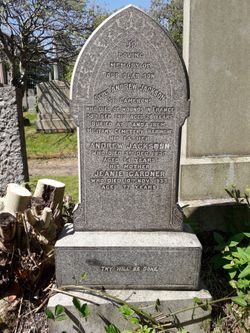Andrew Jackson
Andrew Jackson was the first of quite a footballing indeed sporting family on two continents. His own son, also Andrew, his younger brother, Jimmy, and several of his nephews were all professional footballers of note and another of them, Scotland-born, Archie, was potentially one of Australia's greatest cricketers, an equal to Bradman until the Caledonian curse of tuberculosis struck him down at just twenty-three.
Andrew Jackson Snr was born in Airdrie in 1856. His father was a Steam-Engine Man, at the pit-head presumably. With the family the young Jackson, the eldest of fifteen, of whom fourteen survived, moved first to Cambuslang and then across Glasgow to New Kilpatrick. There at fifteen he was a miner. However, the family would return to Cambuslang, where at twenty-five he, having been a steel-worker, had followed in his father's footsteps.
He had also married, in 1880 to a Cambuslang girl, Jeannie Gardner. They were to have six children. Moreover, he was at twenty-four already eight years into a much-respected football career with the home-town team. And it was also at about this time with the arrival of William Semple at the club he switched from hard-working full-back with physical presence to employing those same qualities at half-back. It led to the captaincy of his increasing locally successful club, representative honours and a first cap in 1886 and in 1888 the winning the Glasgow Cup and a second game for the national side.
However, that same year it also led to a 6-1 defeat by the all-conquering Renton team in the Cup Final that changed football forever. By then Andrew was almost thirty-two and his career winding down. It may explain why he was never persuaded South or elsewhere like some of his team-mates. In fact he would continue playing at home until 1891 and then leave after a major benefit match and with the intention to emigrate. Several years earlier his parents and most of his siblings had joined other members of the wider family in moving to Australia. Andrew and his family followed them but clearly did not settle. They were back within the year and now took themselves to Paisley, he starting as a foreman in a brickworks and eventually becoming the works-manager.

In fact Andrew Jackson Snr would spend the rest of his days in Paisley dying there aged 74 in 1930. Jeannie would follow him three years later and they would both be buried in the town's Woodside Cemetery.
But there is a third person remembered on the grave, that of their second son, Andrew Jackson Jnr.. Born in Cambuslang in 1891 he played junior football with Ardrossan before in1909 as a centre-half just eighteen signing for Middlesbrough. By 1914 he was captain but in 1915 he returned home to enlist. He was sent to France, rose to Sergeant and and was taking part in the final advance in 1918 when wounded fatally. He died a month before Armistice.
Birth Locator:
1856 - High St., Airdrie, Lanarkshire
Residence Locations:
1861 - Airdrie Road, Old Monkland, Lanarkshire
1871 - Blairdardie, New Kilpatrick, Dumbartonshire
1881 - 5, Park St., Cambuslang, Lanarkshire
1901- 21, Underwood Rd., Paisley
1911 - N/A
1921 - 35, Gordon St., Paisley
Death Locator:
1930 - 16, Gordon St., Paisley
Grave Locator:
Back to Johnstone & Paisley,
the Cart Trails
or the SFHG Home page